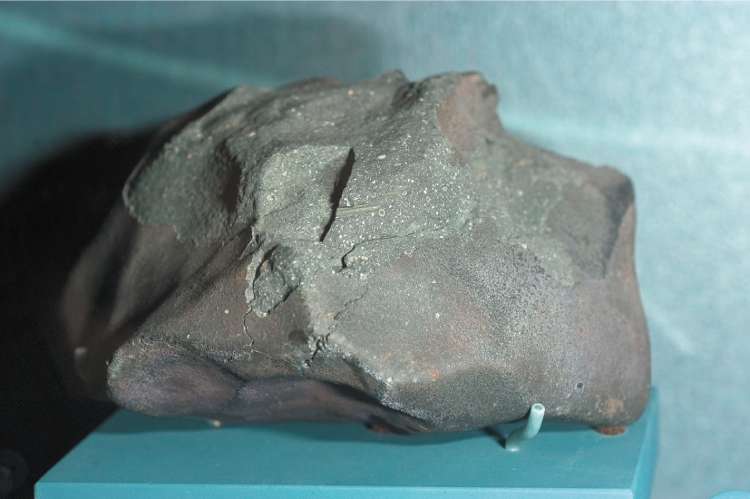Did life begin with a meteorite?
Scientists discover genetic ingredient for creation of man on rock from space

The building blocks of genes have been found in a meteorite, raising the prospect of life originating with the aid of extraterrestrial molecules that came from space more than 3.6 billion years ago.
Scientists have found that the meteorite contains complex organic chemicals which can be used to make self-replicating molecules that are the essential genetic ingredient of all known lifeforms – DNA and RNA.
Although organic molecules such as sugars and amino acids have been found in meteorites before, it is the first time scientists have found evidence for the existence of extraterrestrial compounds that can be used to make genes. The two substances are called uracil and xanthine and they are the precursors of the building-block molecules, known as nucleobases, that help store and transmit genetic information from one generation to the next – one of the vital signs of life.
Scientists found the two building blocks during analysis of a meteorite that fell near the Australian town of Murchison on 28 September 1969. The Murchison meteorite had already been shown to contain sugars and phosphates, two other essential ingredients of DNA and RNA.
"At the compound-class level, you have all the basic components needed to make the buildings blocks of DNA in a single meteorite," said Professor Mark Sephton of Imperial College London, who led the research team. "It's not the compete jigsaw to explain the origin of life, but it is the partial jigsaw. This discovery lends weight to the idea that the building blocks of life came from space."
The origin of life is one of science's greatest unsolved mysteries. Scientists have postulated that it must have begun with simple organic molecules that somehow gained the ability to replicate themselves in a watery environment.
The first fossilised signs of life appear in ancient terrestrial rocks dated to about 3.5 billion years ago and it is known that the Earth suffered a meteorite bombardment between 3.8 and 4.5 billion years ago.
For about 40 years scientists have speculated that these meteorites – fragments of the larger asteroids left over from the origin of the solar system – may have brought the simple organic molecules used by the first lifeforms. The latest discovery of nucleobases in the Murchison meteorite further supports the idea of an extraterrestrial source of the organic molecules necessary for genetic inheritance, said Zita Martins of Imperial College, the lead author of the study, published in the journal Earth and Planetary Science Letters.
"Early life may have adopted nucleobases from meteoritic frag- ments for use in genetic coding which enabled them to pass on successful features to subsequent generations," Dr Martins said.
The analysis of meteorites for signs of life is mired in controversy. However, it is clear that organic molecules of surprising complexity seem to be ubiquitous in space, either on asteroids orbiting the solar system or on meteorites analysed on Earth, said Professor Sephton.
"Because meteorites represent leftover materials from the formation of the solar system, key components for life – including nucleobases – could be widespread in the cosmos," he said.
So where did it all begin?
Primordial soup
First suggested by Charles Darwin and elaborated on by the US chemist Stanley Miller who in 1953 created simple organic molecules in a test-tube.
Hydrothermal vents
These sea-floor volcanic "chimneys" spew out minerals that can react in heat to create the building blocks of life.
Panspermia
The British cosmologist Fred Hoyle first proposed that extraterrestrial microbes could be carried by asteroids and deposited on passing planets.
Divine intervention
Given that Darwinian evolution can explain everything about life but its origins, some believe that the hand of God is needed.
Subscribe to Independent Premium to bookmark this article
Want to bookmark your favourite articles and stories to read or reference later? Start your Independent Premium subscription today.

Join our commenting forum
Join thought-provoking conversations, follow other Independent readers and see their replies